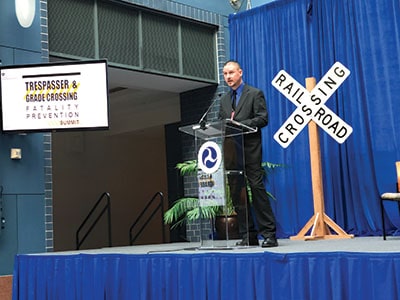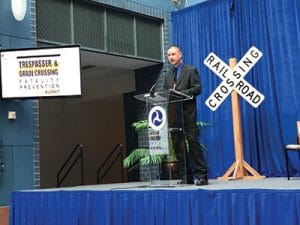
Your browser does not support the video tag.
Tom Cahill, local chairperson of LCA-049 (CSXT – B&O) and vice president of SMART Transportation Division Local 631 (Brunswick, Md.), was among the presenters at the first Trespasser and Grade Crossing Fatality Prevention Summit hosted by the Federal Railroad Administration in late October.
Cahill, a TD member since January 1997, started working on the railroad out of high school and described to the audience his experience during grade crossing collisions and trespasser incidents.
“None of the job interviews or job descriptions in the transportation sector ever covered what we’re talking about today,” Cahill said. “Nobody talked about the first time that you hit a car at a grade crossing or strike a trespasser that’s on the tracks.”
Those incidents, Cahill said, always have dual victims — the person or people who were struck and the train’s operating crew.
“I’ve been pretty lucky – some people have a trespasser injury or fatality every year,” Cahill said.
Factors such as the location of the operator’s route and the time of day play roles in the frequency of trespasser and grade crossing incidents, but the biggest factor is a distracted public, Cahill said.
The usage of personal electronics has decreased situational awareness of trains by pedestrians to “dangerous levels,” he said. If a pedestrian is on or near tracks and distracted, the risk of an accident increases, especially if they’re wearing headphones or earbuds or looking at their smartphone.
“You’d be surprised by the number of incidents where a survivor would say they never saw or heard the approaching train,” Cahill said.
Trauma for crew
Cahill described to attendees two typical types of incidents that train crews experience – a person is struck and killed instantly or a person or people are struck and then are in need of immediate medical attention.
“In either case, after the train stops, it’s the conductor who is required to walk back to the carnage and do what he can to assist the injured and separate the train to open the road crossing for emergency responders’ vehicles,” he said.
It’s a 50-50 proposition whether the responders arrive on the side where the victim is, if they don’t, then treatment could end up being delayed and a life could be lost.
Separating a train to accommodate the emergency vehicles is always a two-person operation, Cahill said, because handbrakes must be applied to multiple cars by the conductor while the engineer remains in the cab to move the locomotive forward to make room for emergency vehicles.
Cahill made special mention that any reduction of a train’s crew to fewer than two people would likely reduce the survival rate of victims of trespasser-grade crossing incidents.
It also falls to the conductor, who usually sees the incident, to give first aid and to direct first responders.
After the incident, Cahill said, the engineer often will second guess whether the brakes were applied in a timely manner and whether the whistle was sounded in time or for a long enough period. While critical incident programs are offered by carriers to give people time off to recover and get counseling, the post-traumatic stress is difficult to overcome.
“It’s not always that easy,” Cahill said. “We take this home to our wives, to our mothers, to our children. Sometimes it’s hard for them to understand why we can’t just shake it off.”
He told the audience that he’s seen situations where over-the-road workers have been traumatized to the point where they will change to yard service to avoid going out on the road.
Cahill said that there tends to be an uptick of incidences in the fall and the holiday seasons.
The days getting shorter reduces visibility, depression may be setting in with some people with the approach of the holidays and winter.
“The suicides are the absolute worst for us because it’s generally not someone who sprints out at the last second and decides to take their life that way,” Cahill said.
He said often the person is already on the track, perhaps around a bend, awaiting the train.
“I’ve heard it too many times where the last thing the train crew sees or remembers is that person either looking up as the train approaches them or looking back as the train overtakes them,” Cahill said. “It’s very difficult for the train crew. There’s little you can do in those situations.
“It can take up to a mile for us to stop, and even if it doesn’t take that long, the damage is done as soon as we strike the person. It’s traumatic.
“We get back up and we go on and we continue out there. We just hope that we never have another one.”
What can be done?
Cahill presented a list of solutions endorsed by SMART TD to reduce the number of grade crossing and trespasser fatalities.
“We’re front line on this issue. SMART Transportation Division is committed to working with all the stakeholders to reduce crossing and trespassing fatalities,” Cahill said. “We want to be a part of identifying these areas and making sure that we’re doing everything we can to address and fix these incidents one by one to make things safer for the public and the train crews.”
Among them:
- More supplemental safety measures such as four quadrant gates that close the entire crossing so cars cannot bypass the gates, even in poorly constructed intersections.
- Use more channelization devices, such as concrete medians, to keep vehicles from crossing over to drive around gates.
Install stationary horns at crossings that are pointed at motorists, an option that is louder and more focused in getting a driver’s attention. - Grade separations so that roads and tracks do not intersect are the best way to prevent crossing accidents, Cahill said. “It’s a money issue, but there’s nothing better than putting the motoring public above or below the railroad tracks,” he said.
- Install more fencing, especially around rail yards and stations.
- Permanently close as many grade crossings as possible.
The major factor is increasing public awareness, Cahill said. All grade crossing and trespasser fatalities are preventable, but he said that often the last thing that people are thinking about when they approach a railroad track is that there is a 20,000-ton freight train bearing down on them.
“It is critically important to educate the public on their obligations and how to stay safe when they’re around train tracks, rail yards and other places where they may be tempted to trespass on the railroad,” he said.
Related News
- Senate Strikes Down Spending Bill’s Harmful AI Provision
- Razor blade found on brake wheel
- Coming Soon: SMART-TD Voluntary Income & Life Protection (VILP) Program
- Senate Passes Tax Bill Without Including Railroaders
- SMART-TD Honors the Retirement of Brother Greg Hynes: A Visionary, a Fighter, and a Legend
- SMART-TD Calls on U.S. Senate to Support the Cantwell Amendment and Protect Rail Workers
- Yardmaster Protection Act Introduced
- PHOTO GALLERY: 2025 Denver Regional Training Seminar
- Fighting for Stronger Heat Protections for Rail Workers
- Regional Training Seminar Sets (Mile-High) Record in Denver
